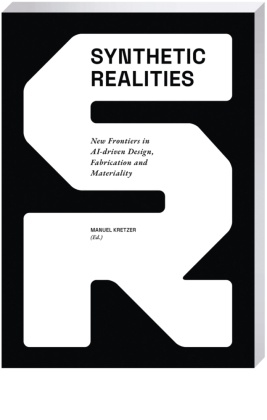
Synthetic realities - New Frontiers in AI-driven Design, Fabrication and Materiality
| Verlag | Spurbuchverlag |
| Auflage | 2024 |
| Seiten | 240 |
| Format | 17,2 x 1,8 x 24,2 cm |
| Gewicht | 633 g |
| Artikeltyp | Englisches Buch |
| ISBN-10 | 3887781082 |
| EAN | 9783887781088 |
| Bestell-Nr | 88778108A |
Synthetic Realities embarks on a groundbreaking journey into the dynamic landscape of design, art and architecture in the era of artificial intelligence. Edited by Manuel Kretzer and authored by a cadre of internationally renowned practitio- ners, educators and thinkers, this collection provides a sweeping overview of how AIis reshaping creative fields, blending the digital with the physical and redefining the boundaries of materiality and aesthetics. The book delves into the profound influence of digitization on creative processes, critically examining how emerging technologies foster new forms of expression and innovation. It navigates the exciting intersection of biology and digital technology, revealing cutting-edge material innovations and bio- digital synergies. Beyond redefining aesthetic and spatial experiences in our digitized era, this volume offers fresh, compelling perspectives on the symbiosis of artificial and organic elements. Concluding with insightful philosophica l reflections, Synthetic Realities is an intellectual odyssey that challenges readers to reconsider their un- derstanding of the relationship between humans, technology and creativity. A must- read for visionaries and enthusiasts, or anyone interested in the future of design and architecture, it beckons you to expand your perspectives and immerse yourself in the limitless possibilities that AI introduces to the worlds of creative endeavour.Authors:VERENA BACHLADIL BOKHARIVERA BÜHLMANN MATIAS DEL CAMPO FELECIA DAVIS MARC ENGENHARTBEHNAZ FARAHI MICHAEL HANSMEYER IMMANUEL KOHMARIA KUPTSOVA SIMON MARIS AGOSTINO NICKL JORGE OROZCO MIRO ROMAN JENNY E. SABIN HANS SACHS LASSE SCHERFFIG KARSTEN SCHUHLMANUEL KRETZER (Ed.)'Do we ever have to understand anything again? When all that can be learned through hard work and persistence is replaced by these new synthetic tools, what are we left with?' The profoundly important essays contained within this volume confront the disruptive impacts of a rtificial intelligence on the world of architecture and design. Synthetic Realities: New Frontiers in AI-driven Design, Fabrication and Materiality, edited by Manuel Kretzer, contains deep reflections from many of the leading AI thinkers and activists in the world today. For everyone striving to come to terms with the upheavals of AI in the design of the built environment this book is essential reading.Prof. Philip BeesleyMultidisciplinary Artist, University Professor and Pioneer of Living ArchitectureAs we hurtle forward into an age of Artificial General Intelligence, it is vital that we reflect on our own material realities - our synthetic realities - and consider how they are being transformed by the immaterial world of artifi-cial intelligence. This book, including essays by a range of internationally renowned practi-tioners, educators, and creatives, represents a ground-breaking journey into the transforma-tive power of artificial intelligence within the realms of design and architecture.Prof. Neil LeachArchitect, Theorist and Writer, Florida International UniversitySynthetic Realities: New Frontiers in AI- driven Design, Fabrication and Materiality is an impressive volume bringing together leading architectural designers, educators, and thinkers to explore artificial intelligence as a creative practice. It integrates a breadth of discourses that inform design ideation, new materiality, and emerging social contexts. It asks how automation changes the underlying infrastructures of creativity, its representa- tion, instrumentalization, and poetics and delves into the ways AI, within the entangled boundaries of digital and physical realms, is reshaping creative fields and redefining the boundaries of materiality and aesthetics.This book critically examines how emerging technologies foster new forms of expression and innovation. It offers new narratives to understand the intersection of biology and digital technology, revealing cu
